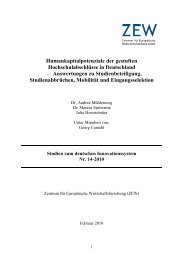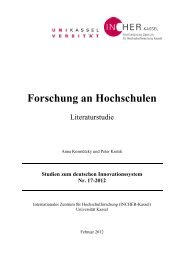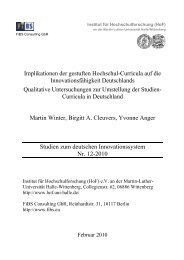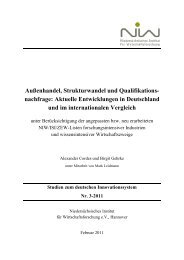research, innovation and technological performance in germany
research, innovation and technological performance in germany
research, innovation and technological performance in germany
Create successful ePaper yourself
Turn your PDF publications into a flip-book with our unique Google optimized e-Paper software.
b 1<br />
30<br />
EFI REPORT<br />
2010<br />
CORE TOPICS 2010<br />
THE GERMAN R&I-SYSTEM IN AN<br />
INTERNATIONAL COMPARISON<br />
The national <strong>research</strong> <strong>and</strong> <strong><strong>in</strong>novation</strong> system <strong>and</strong><br />
the challenges faced<br />
Research <strong>and</strong> <strong><strong>in</strong>novation</strong> worldwide are go<strong>in</strong>g through<br />
a profound transformation process. In future, it will<br />
be necessary to respond <strong>in</strong>creas<strong>in</strong>gly to significant<br />
problems faced by humanity <strong>in</strong> fields such as energy,<br />
climate, environment, <strong>and</strong> demography, <strong>and</strong> R&I<br />
must contribute to solv<strong>in</strong>g these problems. The follow<strong>in</strong>g<br />
developments <strong>in</strong> the <strong>in</strong>ternational <strong><strong>in</strong>novation</strong><br />
system have led to key challenges for the economy<br />
<strong>and</strong> the science systems of many countries:<br />
– New dem<strong>and</strong>s <strong>and</strong> conflicts <strong>in</strong> the fields of energy,<br />
mobility, climate, security, <strong>and</strong> health, which<br />
will require coord<strong>in</strong>ated <strong>research</strong> at various locations.<br />
– Globalisation <strong>and</strong> the spread of <strong>research</strong> resources<br />
<strong>and</strong> expertise between <strong>in</strong>creas<strong>in</strong>g numbers of<br />
countries pursu<strong>in</strong>g active <strong><strong>in</strong>novation</strong> strategies.<br />
– Intensification of competition <strong>and</strong> the acceleration<br />
of <strong><strong>in</strong>novation</strong> processes.<br />
– The <strong>in</strong>creas<strong>in</strong>g concentration worldwide of R&D<br />
activities <strong>in</strong> fiercely contested cutt<strong>in</strong>g-edge technologies,<br />
which are expected to generate considerable<br />
growth effects.<br />
– Knowledge <strong>in</strong>tensification <strong>and</strong> the <strong>in</strong>creas<strong>in</strong>g importance<br />
of knowledge-<strong>in</strong>tensive services.<br />
These factors are lead<strong>in</strong>g to a reorientation of <strong>research</strong><br />
<strong>in</strong> the highly-developed economies. Historically<br />
evolved structures <strong>and</strong> discipl<strong>in</strong>ary divisions<br />
are be<strong>in</strong>g overcome, the traditional division of labour<br />
between basic <strong>research</strong> <strong>and</strong> <strong>in</strong>dustrial <strong><strong>in</strong>novation</strong> is<br />
<strong>in</strong>creas<strong>in</strong>gly be<strong>in</strong>g called <strong>in</strong>to question <strong>and</strong> is be<strong>in</strong>g<br />
replaced by new organisational structures. Dynamic<br />
<strong>in</strong>dustries <strong>and</strong> new fields of dem<strong>and</strong> are <strong>in</strong>creas<strong>in</strong>g<br />
becom<strong>in</strong>g the focus of <strong><strong>in</strong>novation</strong> activity, <strong>and</strong><br />
as a driv<strong>in</strong>g force of <strong><strong>in</strong>novation</strong> processes they are<br />
<strong>in</strong>fluenc<strong>in</strong>g the orientation of R&D. Dem<strong>and</strong>- <strong>and</strong><br />
problem-<strong>in</strong>duced <strong><strong>in</strong>novation</strong> is <strong>in</strong>creas<strong>in</strong>gly provid<strong>in</strong>g<br />
impulses for public <strong>research</strong>. 32<br />
The <strong>research</strong> <strong>and</strong> <strong><strong>in</strong>novation</strong> policy-makers <strong>in</strong> many<br />
countries have not yet responded adequately to these<br />
structural changes. This is also the case <strong>in</strong> Germany.<br />
The German R&I system has developed considerable<br />
potential <strong>in</strong> important fields, but it must be oriented<br />
more to the challenges of the future <strong>and</strong> new<br />
topics. With the High Tech Strategy, <strong>in</strong> which the<br />
emphasis is placed on the most important fields for<br />
Germany, the Federal Government has managed to<br />
start the necessary reorientation. Further steps should<br />
follow, <strong>and</strong> should also be accompanied by organisational<br />
changes to the <strong>research</strong> system <strong>and</strong> to <strong><strong>in</strong>novation</strong><br />
policies.<br />
In order to be able to evaluate <strong>and</strong> control these<br />
structural changes to the R&I system, a detailed<br />
analysis of the <strong>research</strong> system <strong>and</strong> its most important<br />
components is required. This section of the report<br />
will first consider the <strong>in</strong>dustrial R&D system,<br />
followed by an assessment of the structure of the<br />
public science system.<br />
The <strong>research</strong> <strong>and</strong> <strong><strong>in</strong>novation</strong> system<br />
of the private sector<br />
Germany has a well-developed <strong>and</strong> effective <strong>in</strong>dustrial<br />
R&D system, which concentrates on the most


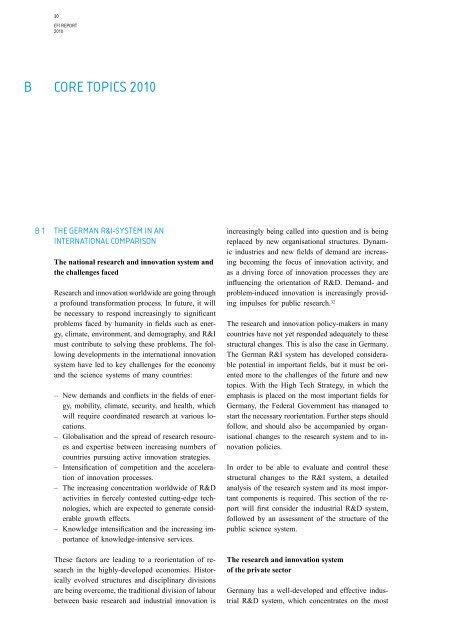
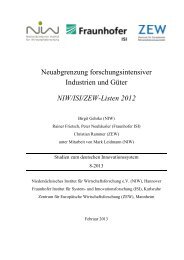



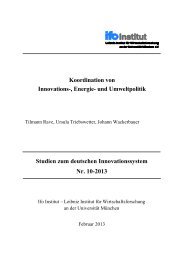

![zur Studie [Pdf, 2.574 KB] - Expertenkommission Forschung und ...](https://img.yumpu.com/20748637/1/184x260/zur-studie-pdf-2574-kb-expertenkommission-forschung-und-.jpg?quality=85)


